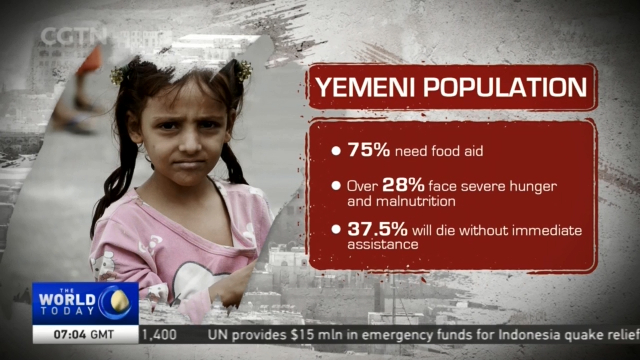
15:36, 03-Oct-2018
Yemen Conflict: Multiple threats combine to present looming catastrophe
Updated
15:07, 06-Oct-2018
05:05

We continue with our series 'Inside Yemen'. Armed conflict, displacement, risk of famine, and disease outbreaks. The conditions in Yemen have led to what international groups are calling the worst man-made humanitarian crisis in the world right now.
Some 75 percent of the population -- that's over 22 million people -- are in desperate need of food. Among them, 8.4 million are threatened by severe hunger and malnutrition. Over 11 million will require immediate assistance to survive – that's up by one million since June of 2017. Our correspondent Natalie Carney takes us inside Yemen with this latest report.
NATALIE CARNEYADEN, YEMEN "Food and humanitarian aid are still arriving in Yemen's ports, but endemic unemployment, high food prices and blockades have made that food virtually impossible to access for millions of Yemenis, putting more than eight million people at risk of starvation and turning the country into the world's worst humanitarian crisis. We take a closer look at the lack of adequate food sources and subsequent famine in Yemen, but we must warn you that some of the images you are about to see may be disturbing."
This ward at Aden's Al Sadaka hospital treats severe acute and chronic malnutrition.
Dr. Aida Alsadeeq works here and with the World Health Organization to establish the internationally recognized indicators for different degrees of malnutrition.
She is currently pushing to expand those categories to reflect the unhistorical severity of cases that she is seeing.
DR. AIDA H.M ALSADEEQPEDIATRIC CONSULTANT "What we have found recently is that the cases are very very severally mal-nutrition. If we have another column of less than 5,6,7 this is the cases which we found recently."
Every room is filled with multiple patients.
DR. AIDA H.M ALSADEEQ PEDIATRIC CONSULTANT "Look how severe she is!"
16-month-old Tasmine and her mother are internally displaced people from the city of Taiz, which experienced some of the worst fighting.
DR. AIDA H.M ALSADEEQ PEDIATRIC CONSULTANT "She came with severe acute malnutrition for nutrition rehabilitation and complicated with acute watery diarrhea. That is why the IV fluid is here."
1-year-old Abdu Saed Salam is also suffering from severe acute malnutrition and is also from Taiz where local clinics are overwhelmed.
DR. AIDA H.M ALSADEEQPEDIATRIC CONSULTANT "They have centres there in al Misrakh, in Taiz, working centres there, and we are still receiving the cases from there."
Abdu Saed's mother spent about 200 USD, all their savings, to get him to Aden for treatment.
They have been living in an IDP camp where they get oil, sugar, milk and rice, but Abdu Saed is still losing weight rapidly.
MOTHER OF SON WITH MALNUTRITION "Because of the war I came from Taiz. I was afraid of the air strikes so I left everything behind. I asked for the doctor's help because he had diarrhea, vomiting and fever, and it was discovered he had acute malnutrition. In the last two, three months he started to lose weight."
4-month-old Mohammed Abdu is from Houdaidah. He may have survived constant airstrikes on his village, but now he is fighting against starvation.
This hospital reflects the very dire conditions across the country.
Most of Yemen's trade and food aid was coming through the country's western port city of Houdaidah until the Saudi coalition began restricting imports and bombing the area.
NATALIE CARNEY ADEN, YEMEN "The recent offensive on Hodeidah by the Saudi led coalition is putting more and more pressure on the Iranian aligned Houthi movement who currently control it. Allegations have been made that the rebels are smuggling in weapons through the port city. But if the trade route is cut off to them, so will be all the food and aid that goes to millions of civilians in Houthis controlled areas."
Roughly 18 million of Yemen's 27 million people require full food assistance while over 8 million are at risk of starvation.
The affordability and access to food across Yemen are at their lowest level ever according to the World Food Program.
MOHAMMED ALI MOHAMMEDHEAD OF WORLD FOOD PROGRAM IN ADEN "The country now is facing severe food shortage in terms of local production and imported goods given the fact that the main port in Houdaidah has been closed over the last one and half year. This is attributed also (by) the soaring market prices, which is really going up."
This has pushed Yemen to the brink of famine as the need for food and other humanitarian aid across the country increase steadily.
NATALIE CARNEYADEN, YEMEN "Aid agencies accuse both warring sides of using food and aid as a weapon and fear that restricting access to them could kill more people than all the guns, bombs and airstrikes put together. Natalie Carney, CGTN, Aden, Yemen."

SITEMAP
Copyright © 2018 CGTN. Beijing ICP prepared NO.16065310-3
Copyright © 2018 CGTN. Beijing ICP prepared NO.16065310-3